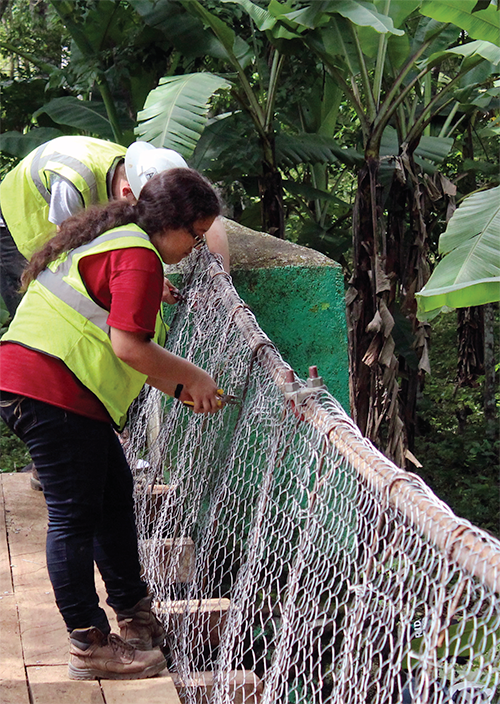?The Opportunity Kid? transformed his home state through entrepreneurship, art, and education.
A self-made entrepreneur, visionary philanthropist, and generous champion of Iowa students, John Pappajohn used his success in the business world to make the greater world?and particularly his alma mater University of Iowa?a better place.?
Pappajohn (52BS, 10LHD) died April 22, 2023, at age 94.?
Pappajohn was one of the nation?s earliest and most successful venture capitalists?elite investors who provide capital to emerging companies. His shrewd business instincts and knack for striking a deal were legendary, as was his work ethic. Even in his 90s, Pappajohn could be found in his Des Moines office seven days a week, driven by the same entrepreneurial spirit that helped him launch more than 100 companies over the course of his 50-plus-year investing career.?
But Pappajohn always set his sights on something greater than just the bottom line. A close friend once said Pappajohn only made money so he could give it away. Indeed, he and late wife Mary donated to philanthropic causes around the world, with a particular fondness for higher education and the arts. Pappajohn?s leadership and largess is nowhere more apparent than here at the University of Iowa, where his impact has been transformative.?
In 1993, the Pappajohn Business Building, home of the Henry B. Tippie College of Business and one of the UI?s largest academic buildings, opened its doors thanks to his naming gift. The campus landmark houses the John Pappajohn Entrepreneurial Center, one of five innovation incubators he established at Iowa colleges and universities in 1996. As of 2022, more than 421,000 people had participated in JPEC programs across Iowa, including 161,092 at the UI. More than 8,500 new businesses and 17,400 jobs had spun out of the centers at the UI, Iowa State, Northern Iowa, Drake, and North Iowa Area Community College. In 2021, the Pappajohns announced a new gift to JPEC to further entrepreneur education and programming.?
On the UI medical campus, his philanthropy led to the 1991 construction of Pappajohn Pavilion at UI Hospitals & Clinics. The John and Mary Pappajohn Clinical Cancer Center debuted two years later as part of Holden Comprehensive Cancer Center. And in 2014, the couple cut the ribbon on the John and Mary Pappajohn Biomedical Discovery Building and the Pappajohn Biomedical Institute, where researchers work to understand the fundamentals of disease and improve human health.?
PHOTO: MARK STASTNY
John Pappajohn is pictured in 2016 outside UI Stead Family Children?s Hospital with two sculptures by artist Deborah Butterfield that Pappajohn and his wife, Mary, donated when the hospital opened.
The Pappajohns established numerous UI scholarship and faculty funds, and John was a dedicated member of several university boards and committees, including serving as a longtime board member for the UI Center for Advancement and former UI Foundation. The university presented him with its Distinguished Alumni Award for Service in 1996, the Hancher-Finkbine Medallion in 2004, and an honorary doctorate in 2010. ?Mary and I feel strongly that a successful life must include service to society and our fellow man,? Pappajohn told Iowa Magazine in 2018. ?This is how we will be judged. We must all try to make a difference in this world.??
Humble Iowa Beginnings
Pappajohn was born July 31, 1928, in Greece, the eldest of George and Maria Pappajohn?s three children. A few years earlier, George had immigrated to America and settled in Mason City, Iowa, where he worked for a time at a brick and tile factory before opening his own grocery store. He met Maria after returning home to Greece with designs of finding a wife. Soon, John was born, and when he was 9 months old, Maria and her child boarded a ship in the Port of Piraeus and set sail for the U.S. to reunite with George. The couple welcomed two more children in the coming years in Mason City?Aristotle Pappajohn (52BSC) and Socrates Pappajohn (56BA, 58JD).?
John and his two younger brothers grew up in the Great Depression learning the value of a dollar and a hard day?s work. Beginning at age 5, John pitched in at his father?s corner store, Evia Meat and Grocery Co., named for the family?s hometown in Greece. The store was open from 6 a.m. to 10 p.m. seven days a week (it closed only for a half day on Christmas), and John spent his free time cleaning and stocking shelves when he wasn?t in school. The Pappajohns? Mason City neighborhood was a melting pot of ethnicities, and John?s grade school was made up of children from dozens of different nationalities. The family earned enough to scrape by, but others in the neighborhood were less fortunate. During those lean years, the Pappajohns saved chicken feet and soup bones to give out to hungry families and allowed customers to purchase food on credit.?
John?s status as an immigrant, while hardly unique in the north-central Iowa town, often put him at a disadvantage early in life. He remembers being turned away by the local Boy Scouts because of his ethnicity and the fact that he lived, quite literally, on the wrong side of the railroad tracks. He had to repeat kindergarten because he spoke little English. But what John lacked in social status he made up for with pluck. ?I was an entrepreneur when I was born,? Pappajohn once said. Always trying to earn a buck, John collected brass, copper, steel, rags, and whatever else of value he could fit in his gunny sacks at the city dump, then sold it to the scrapyard dealer. When he would talk about his childhood later in life, he called himself ?the Opportunity Kid.??
Pappajohn?s teenage years were largely defined by loss. His father, a heavy smoker, died when John was just 16. Because he was the eldest of the brothers and his mother spoke little English, the responsibility of keeping the store open fell squarely on John?s shoulders. George?s death was traumatic, but it also hardened John?s resolve to make something of himself and help his brothers succeed. ?All three of us learned to make decisions and survive and move forward in our lives,? John said in 2017 when he received the Paradigm Award from the PanHellenic Scholarship Foundation. ?One of my favorite quotes is, ?Adversity is a blessing in disguise.???
The three brothers put themselves through college by taking turns attending the University of Iowa for a year or two, then staying home for a year to manage the store. They each graduated from the UI, including John in 1952 after six years of off-and-on attendance. While a student, he worked nearly 40 hours a week as a butcher at Brady?s Supermarket in downtown Iowa City for $2 an hour, saving enough to graduate debt free and with $2,000 in the bank.?
From Insurance Sales to Business Titan
Pappajohn spent his early career selling insurance, but a pivotal moment in his life came while serving as president of a life insurance underwriting group. The organization invited a guest speaker to Iowa named W. Clement Stone, a Chicago insurance executive and the author of a book called Success Through a Positive Mental Attitude. ?I picked him up at the airport in a Volkswagon he didn?t like,? Pappajohn recalled in 2018. ?I found out later he had a Series 600 Mercedes with a chauffeur. He got in my car and said, ?Why don?t you start your own insurance company?? I said, ?Because I don?t have any money.? He said, ?You don?t need any money; buy my book.??
Pappajohn did just that. He read the book cover to cover and became a disciple of Stone and his message about the power of PMA?positive mental attitude. He soon decided to follow his dream and start his own insurance company. After traveling the state to recruit board members and investors, Pappajohn founded the Guardsman Life Insurance Company in 1962 in Des Moines, and he served as its chairman for seven years.?
One day in the late 1960s, Pappajohn was flipping through the Wall Street Journal when a story about a businessman named Ned Heizer caught his eye. Heizer was described as a venture capitalist, an investor who funded fledgling companies and made money as they grew. Pappajohn had never heard of venture capitalism, a relatively new industry, but the concept thrilled him. He left Guardsman in 1969 with about $100,000 in savings and commissions due and established Equity Dynamics, a financial consulting firm, and Pappajohn Capital Resources, a venture capital firm.?
PHOTO: MARK STASTNY
John Pappajohn is pictured at a university event in 2015.
Pappajohn sank his $100,000 into a Des Moines lawn mower company?an investment that ultimately proved to be a wash. But a few years later, he made his first million by helping launch Kay Laboratories, a San Diego company that held patents for the hot and cold packs used in hospitals. Pappajohn recognized the promise of the biomedical industry, and a string of lucrative ventures soon followed on the West Coast. Most notably, Pappajohn invested in the nation?s first home health care company, Caremark, which today is a part of CVS Caremark. In the coming decades, Pappajohn fostered more than 100 startups, facilitated over 50 initial public offerings, and served as a director for more than 40 public companies.?
A Champion for the Arts
John and Mary wed in 1961 and settled in Des Moines, where they raised their daughter, Ann, and became deeply involved in cultural organizations like the Des Moines Art Center. Mary had studied art at the University of Minnesota, and John came to share her love of painting and sculpture. Over the years the Pappajohns became regular attendees at New York auction houses and amassed a contemporary art collection that rivaled that of many museums. From 1998 to 2014, they were a fixture on ARTnews magazine?s list of the top 200 collectors in the world, and Pappajohn served as vice chair at the Smithsonian?s Hirshhorn Museum and was a trustee for the National Gallery of Art.?
The couple established the Pappajohn Sculpture Park in downtown Des Moines in 2009. In a partnership with the Des Moines Art Center and the city, the Pappajohns donated a number of major sculptures that had previously stood on their lawn and attracted frequent sightseers. Today, the 4.4-acre park is a signature cultural attraction for the city and features 32 sculptures from world-class artists. Mary, who died in March 2022, was involved in board leadership roles with art galleries and organizations across the country.?
Pappajohn might have spent his career investing in promising companies, but he found his greatest joy investing in the future of young Iowans. Pappajohn told Forbes magazine in the 1990s that his ambition was to become ?the greatest philanthropist in the history of Iowa.? Through his support of the arts, young entrepreneurs, the University of Iowa, and higher education institutions across the state, he made a strong case for himself.?
In 2015, Pappajohn visited the UI campus to give a lecture about the importance of philanthropy. ?I dream a lot, I dream constantly,? he told a crowd of students at the Iowa Memorial Union. ?I don?t have these wild dreams, I just dream about what I want to do and want to give away and what are my priorities in life. ? How can I help the world with the time I have left?? ?
Read more?about John Pappajohn?s impact and legacy at Iowa.


